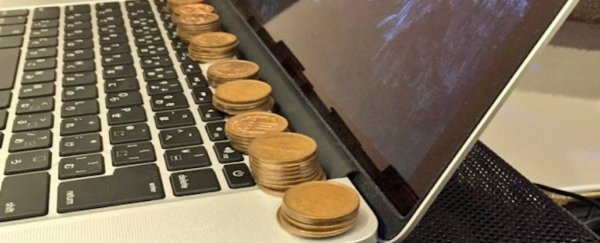We've all been through the frustration of an uncomfortably hot computer - you're in the middle of a 3-hour dungeon crawl (or the fifth episode in a row of Game of Thrones), and suddenly the fan kicks into high-gear and your laptop starts burning into your legs.
But a Japanese twitter user has come up with the ultimate (and easiest) solution to the problem: simply stack copper coins on top of your machine to cool it down, using the power of thermodynamics.
Right now, you're either sitting there bowing down to the genius we've just gifted your life, or are wondering how the hell we hadn't already figured that out, and in the case of the latter, bravo to you. You're officially better than us at applying chemistry to the requirements of modern computing.
But for those of you in that first group, this is how it works - as Japanese site IT media found out back in 2012, the Macbook Pro with Retina Display can run pretty hot when it's working at the limits of its performance.
Using thermodynamic scanning, they were able to show that the heat is focussed towards the back of the computer, which you've probably felt yourself (temperatures below in degrees Celsius):

Based on that information, Japanese Twitter user akinori_suzuki decided to start stacking 10-yen coins, which are primarily made out of copper, on top of his laptop.
That's pretty brilliant, seeing as copper has much greater thermal conductivity than aluminium or plastic - which most laptops are made out of. Because of the laws of thermodynamics, this means that, as long as the copper coins are cooler than your computer, they'll 'soak up' the heat that would otherwise be causing issues for your central processing unit.
You can see the original Tweet below (in Japanese!) and an image of akinori_suzuki's own set-up:
MacBook Proの内部温度が下がらなくて困ってるという人は、アルミよりも熱伝導率が優れている銅を使って熱を逃がすと良いので、まずは家にある十円玉をかき集めて試してみるべし。 pic.twitter.com/7hc6E8Tky9
— 鈴木秋則 (@akinori_suzuki) November 2, 2015
To poorly translate that, with the help of Interesting Engineering, it says something along the lines of:
"If anyone is having a problem with their MacBook Pro getting too hot and not cooling down, try using some 10-yen coins you have lying around the house. The copper in the yen is a better conductor of heat than the aluminium of the computer and is good for getting the heat out."
As tends to happen online, the internet took his idea and ran with it, with other Twitter users sharing images of their own setups - and it turns out it's not just for laptops, it can also cool down your desktop tower:
To be clear, this is an unproven idea from the internet - the results haven't been tested in a proper, peer-reviewed experiment, and there's no guarantee that this is going to work for everyone. But the response online suggests it's pretty successful for a lot of computer lovers out there.
And for those of you feeling upset that you're not living in Japan - the land of the copper coin - don't worry. In Australia, every coin contains more than 50 percent copper, and in the UK, the pennies are all made mostly of the metal.
But the bad news for the US is that pennies haven't contained more than 2.5 percent of copper since 1981, so while any coins before that are going to cool your system down, the more recent zinc-based coins aren't going to be hugely helpful (zinc is less thermally conductive than aluminium).
In case you need another reason to give it a try (or invest in some copper of your own), research has also shown that copper kills the superbug MRSA on contact, so if you're working in or around a hospital that might be another handy benefit.
We're totally trying this one at home.

